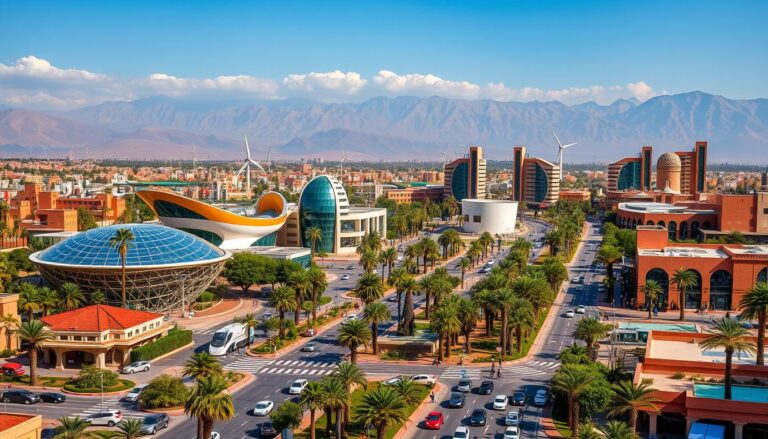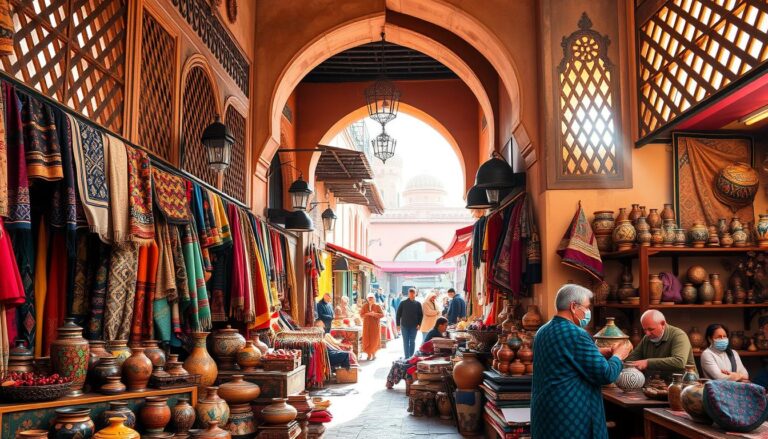Are you curious about the challenges facing Morocco’s financial sector and how it is navigating through them?
In this article, we will explore the impact of global economic uncertainties on Morocco’s financial sector and delve into the measures and reforms that are being implemented to strengthen it.
We will also discuss how efforts are being made to enhance financial stability and resilience in the face of these challenges.
In recent years, global economic uncertainties have posed significant challenges for Morocco’s financial sector.
The country has had to navigate through a volatile international market, fluctuations in exchange rates, and changing regulations and policies.
However, despite these challenges, Morocco has taken proactive steps to ensure the stability and growth of its financial sector.
Through various measures and reforms, such as strengthening regulatory frameworks and improving risk management practices, Morocco is striving to create a more resilient financial system.
Additionally, efforts are being made to enhance transparency and accountability in order to rebuild trust in the sector.
By addressing these issues head-on, Morocco is positioning itself as an attractive destination for foreign investors while also safeguarding its domestic economy.
Overall, navigating through the challenges faced by its financial sector requires a strategic approach from Moroccan authorities.
By implementing effective measures and reforms, enhancing stability and resilience, as well as addressing issues related to financial inclusion, Morocco aims to overcome these obstacles successfully.
In doing so, it can position itself for future opportunities in an ever-changing global economic landscape.
Key Takeaways
- Morocco’s financial sector is facing challenges due to global economic uncertainties, including volatile international markets, exchange rate fluctuations, and changing regulations and policies.
- The Moroccan authorities have taken proactive steps to ensure stability and growth in the financial sector, including strengthening regulatory frameworks, improving risk management practices, and enhancing transparency and accountability.
- Diversification is seen as a strategy to mitigate the impact of global economic uncertainties, while stricter capital adequacy requirements and stress testing exercises are being implemented to enhance the resilience of Moroccan banks.
- Embracing digitalization and fostering innovation in the financial sector is crucial for the growth and resilience of Morocco’s financial sector, with mobile banking and digital financial services offering convenience and efficiency in conducting financial transactions.
Impact of Global Economic Uncertainties
You might be wondering how the impact of global economic uncertainties affects Morocco’s financial sector.
Global economic uncertainties have a significant impact on Morocco’s financial sector, as it’s highly integrated into the global economy. Any disruptions in the global market can lead to fluctuations in exchange rates, capital flows, and investor confidence, which directly affect the performance of Moroccan banks and other financial institutions.
To mitigate the impact of these uncertainties, strategies are implemented to ensure stability and resilience in Morocco’s financial sector. One such strategy is diversification. By diversifying their portfolios across different sectors and asset classes, Moroccan banks can reduce their exposure to specific risks and better withstand any shocks from the global economy.
Additionally, strengthening risk management practices and enhancing transparency are crucial measures to maintain stability during uncertain times.
Furthermore, policymakers in Morocco have been proactive in implementing reforms to strengthen the financial sector. These reforms focus on improving regulations and supervision to ensure that banks operate prudently and manage risks effectively. The introduction of stricter capital adequacy requirements and stress testing exercises has enhanced the resilience of Moroccan banks against potential shocks from outside forces.
Global economic uncertainties have a profound influence on Morocco’s financial sector due to its integration into the global economy. However, through diversification strategies and strong risk management practices, Moroccan banks aim to mitigate these impacts effectively. Furthermore, ongoing measures and reforms implemented by policymakers contribute towards strengthening the financial sector’s resilience. These initiatives will be further explored in subsequent sections about measures taken to strengthen Morocco’s financial sector, without writing ‘step.’
Measures and Reforms to Strengthen the Financial Sector
Explore the various measures and reforms undertaken to enhance the strength of the financial sector, as you witness a transformation in its resilience and stability. Strengthening regulations has been a key focus for Morocco’s financial sector in recent years. The government has implemented stricter regulatory frameworks, aimed at improving transparency, risk management, and corporate governance. These measures help create a more stable and secure environment for both investors and financial institutions.
In addition to strengthening regulations, Morocco’s financial sector is also fostering innovation to enhance its competitiveness. The country has embraced technological advancements such as digital banking services and fintech solutions. This not only improves access to financial services for individuals and businesses but also promotes efficiency within the sector. By encouraging innovation, Morocco aims to position itself as a regional hub for finance and attract foreign investment.
Furthermore, efforts are being made to enhance collaboration between different stakeholders in the financial sector. Public-private partnerships have been established to promote dialogue and cooperation between regulators, banks, insurance companies, and other market participants. This collaborative approach allows for better coordination in implementing reforms and addressing challenges faced by the industry.
As Morocco continues on its path towards enhancing the strength of its financial sector, it is crucial to ensure that these measures are sustainable and effective in promoting long-term stability. By strengthening regulations, fostering innovation, and promoting collaboration among stakeholders, Morocco is well-positioned to navigate challenges while bolstering its financial stability.
As we move into the next section about enhancing financial stability and resilience, it becomes evident that these measures will play a crucial role in achieving this goal.
Enhancing Financial Stability and Resilience
Embrace the measures and reforms that bolster financial stability and resilience, as you witness a transformation in the sector’s ability to weather uncertainties and safeguard your investments.
In order to achieve this, it’s imperative for Morocco’s financial sector to focus on enhancing financial stability. This can be achieved by strengthening the regulatory framework, ensuring that it’s robust enough to prevent risks and mitigate potential crises.
Having a strong regulatory framework is key to maintaining financial stability. It provides a set of guidelines and rules that govern the operations of financial institutions, ensuring they adhere to best practices and avoid excessive risk-taking.
By implementing stricter regulations and supervisory mechanisms, Morocco can create an environment where both domestic and foreign investors have confidence in the integrity of its financial system.
Furthermore, enhancing financial stability also involves improving risk management practices within the sector. This includes conducting regular stress tests on banks and other financial institutions to assess their ability to withstand adverse scenarios. By identifying potential vulnerabilities in advance, necessary steps can be taken to address them effectively.
By focusing on these aspects, Morocco’s financial sector will be better equipped to handle economic challenges while providing a stable environment for investors.
As you move forward into addressing the challenges of financial inclusion, remember that a strong foundation of financial stability is crucial for inclusive growth and sustainable development.
Transitioning into addressing the challenges of financial inclusion, it becomes evident that expanding access to finance for all segments of society is essential for achieving long-term prosperity.
Addressing the Challenges of Financial Inclusion
In order to address the challenges of financial inclusion, it’s crucial to focus on expanding access to financial services in rural and underserved areas. This can be achieved by establishing more branches and mobile banking facilities in these regions.
Additionally, promoting financial literacy and education is essential to empower individuals with the knowledge and skills needed to make informed financial decisions.
Lastly, encouraging the use of digital financial services and mobile banking can greatly enhance accessibility and convenience for those who may not have easy access to traditional banking services.
Expanding Access to Financial Services in Rural and Underserved Areas
Despite the challenges, rural and underserved areas in Morocco can gain access to financial services and create a path towards economic empowerment. Financial inclusion challenges such as limited physical infrastructure and low income levels have historically hindered the provision of banking services in these areas.
However, innovative solutions are emerging to address these issues and expand access to financial services. One approach is the establishment of mobile banking services, which allow individuals in remote areas to conduct basic banking transactions through their mobile phones. This technology has the potential to bridge the gap between traditional banking and underserved populations by providing convenient and affordable financial services.
Additionally, microfinance institutions are playing a crucial role in extending credit facilities to individuals who lack collateral or formal employment. These institutions offer small loans that can be used for various purposes such as starting a business or investing in agriculture, empowering individuals to generate income and improve their financial well-being.
Despite the challenges faced by rural and underserved areas in Morocco, there are viable solutions that enable access to financial services. Mobile banking and microfinance institutions are key players in expanding financial inclusion and promoting economic empowerment among these communities. By leveraging these initiatives, individuals can overcome barriers and gain opportunities for growth and prosperity.
Transitioning into the subsequent section about ‘promoting financial literacy and education’, it is important to note that improving access alone is not enough; educating individuals about managing finances effectively will further enhance their ability to make informed decisions about money matters.
Promoting Financial Literacy and Education
To truly empower yourself financially, it is essential to prioritize gaining knowledge and understanding through financial literacy and education. By participating in financial literacy initiatives and educational campaigns, you can equip yourself with the necessary tools to make informed decisions about your finances. These initiatives aim to improve individuals’ understanding of basic financial concepts such as budgeting, saving, investing, and managing debt.
Financial literacy initiatives often take the form of workshops, seminars, or online courses that provide practical information and resources. They focus on improving financial skills by teaching individuals how to create a budget, manage their expenses effectively, and plan for long-term goals like retirement or homeownership. Educational campaigns play a crucial role in raising awareness about the importance of financial literacy and encouraging individuals to take proactive steps towards improving their financial well-being.
| Benefits of Financial Literacy Initiatives | Importance of Educational Campaigns | Resources Available |
|---|---|---|
| Increased understanding of basic financial concepts | Raising awareness about the significance of financial education | Workshops and seminars |
| Improved ability to make informed decisions about finances | Encouraging individuals to take proactive steps towards improving their financial well-being | Online courses |
| Enhanced skills in budgeting, saving, investing, and debt management | Equipping individuals with practical information and resources for better money management | Educational materials |
By promoting financial literacy and education through these initiatives and campaigns, individuals can develop the knowledge they need to navigate Morocco’s evolving financial sector successfully. This knowledge will serve as a foundation for making sound judgments when it comes to personal finance decisions. Transitioning into the subsequent section about ‘encouraging the use of digital financial services and mobile banking,’ we explore how technology plays an important role in expanding access to convenient banking services across rural areas.
Encouraging the Use of Digital Financial Services and Mobile Banking
Moving on from the previous subtopic on promoting financial literacy and education, let’s now focus on the importance of encouraging the use of digital financial services and mobile banking in Morocco’s financial sector.
In today’s rapidly evolving world, digital transformation has become a crucial aspect for industries worldwide, including the financial sector. With advancements in technology, mobile payment solutions have emerged as a convenient and efficient way to conduct financial transactions.
The adoption of digital financial services and mobile banking offers numerous benefits for both consumers and businesses. For consumers, it provides greater convenience by allowing them to access their finances anytime, anywhere through their smartphones. This means they can easily check their account balances, transfer funds, pay bills, and even make purchases with just a few taps on their screens. Additionally, these services often come with enhanced security measures that protect users’ personal information and transactions.
Incorporating digital transformation into Morocco’s financial sector opens up opportunities for increased financial inclusion among underserved populations who may have limited access to traditional banking services. By promoting the use of mobile payment solutions, individuals in remote areas or those without easy access to physical bank branches can still participate fully in the economy.
Moreover, this shift towards digital finance aligns with global trends where many countries are moving towards cashless economies. As we explore future outlook and opportunities for Morocco’s financial sector, it is evident that embracing digitalization will play a significant role in shaping its growth and resilience going forward.
Future Outlook and Opportunities for Morocco’s Financial Sector
You’ll be pleased to know that Morocco’s financial sector is poised for growth and offers numerous opportunities. Did you know that the country’s banking assets have increased by 7% in the past year, reaching a total of $140 billion? This growth trend is expected to continue in the future, with several key factors driving the expansion of Morocco’s financial sector.
Firstly, one of the future trends that will shape the industry is digitalization. As technology continues to advance, more Moroccans are embracing digital financial services and mobile banking. This presents an excellent opportunity for banks and other financial institutions to tap into this growing market and offer innovative solutions tailored to meet customers’ needs. With a large population of tech-savvy individuals, there is immense potential for further adoption of digital services in Morocco.
Secondly, investment opportunities abound in Morocco’s financial sector. The government has been actively promoting foreign direct investment (FDI) in various industries, including finance. The country’s stable political environment and strategic location make it an attractive destination for international investors looking to expand their presence in Africa. Additionally, Morocco has implemented favorable policies and regulations to stimulate investment and ensure ease of doing business.
To give you a better understanding of the potential opportunities in Morocco’s financial sector, take a look at this table:
| Investment Opportunities | Potential Gains |
|---|---|
| Infrastructure Development | High Returns |
| Renewable Energy Projects | Sustainable Growth |
| Islamic Banking Services | Untapped Market |
Another area that holds promise for future growth is Islamic banking services. With over 99% of Moroccans identifying as Muslims, there is a significant demand for Sharia-compliant financial products. However, this market remains largely untapped, presenting an opportunity for both local and international banks to offer specialized Islamic banking services tailored to Moroccan customers’ needs.
In conclusion, Morocco’s financial sector offers a bright outlook filled with potential opportunities. The country’s banking assets continue to grow, driven by the increasing adoption of digital financial services and mobile banking. Moreover, future trends such as digitalization and Islamic banking present avenues for further expansion. With the government actively promoting investment and creating a favorable business environment, Morocco is an attractive destination for both domestic and foreign investors looking to capitalize on the country’s economic growth.
Conclusion
In conclusion, navigating the challenges in Morocco’s financial sector requires a proactive approach and a commitment to reforms. The impact of global economic uncertainties can’t be ignored, but with the right measures in place, the sector can strengthen its resilience.
Enhancing financial stability is crucial to weathering any storms that may come its way.
Furthermore, addressing the challenges of financial inclusion is essential for ensuring that all segments of society have access to the benefits of a robust financial system. By promoting inclusive policies and initiatives, Morocco can create opportunities for economic growth and development.
Looking ahead, there are promising opportunities for Morocco’s financial sector to thrive. With continued reforms and a focus on innovation, it has the potential to become a hub for regional finance. As they say, "The sky’s the limit."So let’s embrace these challenges head-on and work towards building a stronger and more inclusive financial sector in Morocco.

The Editorial Team is a passionate group of Morocco enthusiasts dedicated to sharing the beauty, culture, and wonders of this captivating country. With diverse backgrounds and a deep love for travel, we strive to bring you engaging and informative content that inspires your Moroccan adventures. From uncovering hidden gems and sharing local insights to exploring mouthwatering cuisine and showcasing the vibrant lifestyle, our team is committed to providing you with valuable resources and exciting stories that enhance your exploration of Morocco. Join us on this journey as we celebrate the rich heritage and unforgettable experiences that make Morocco truly special.






